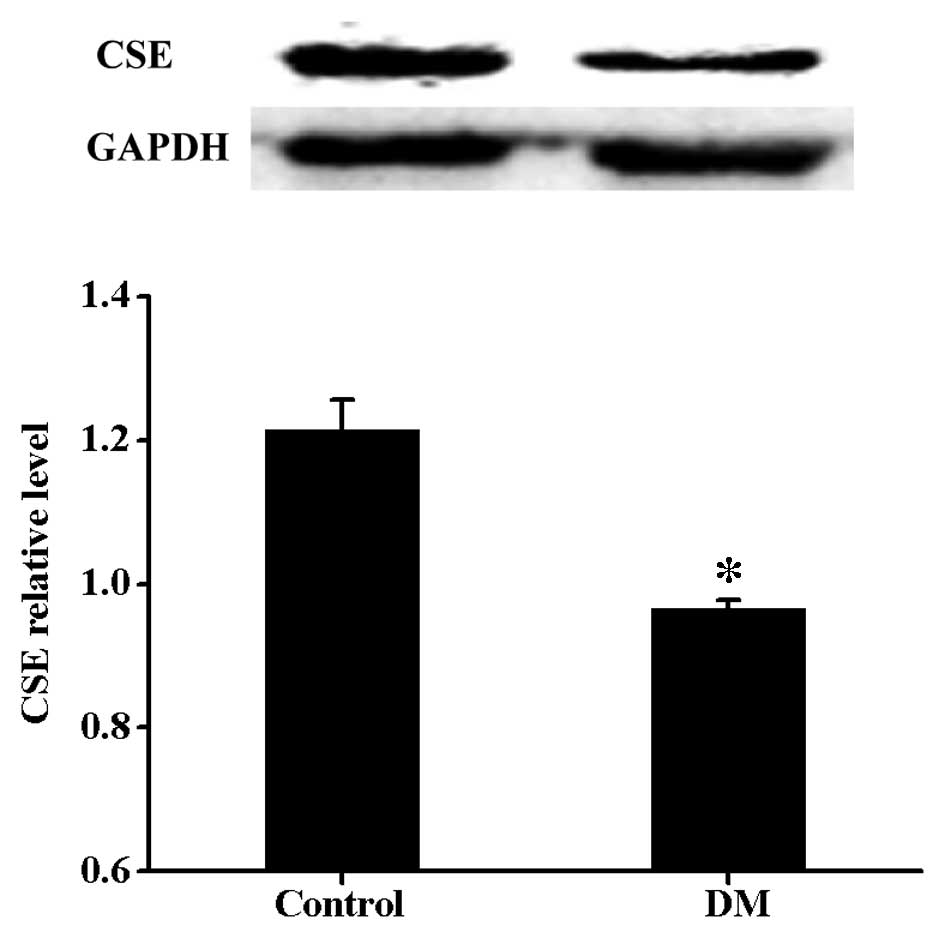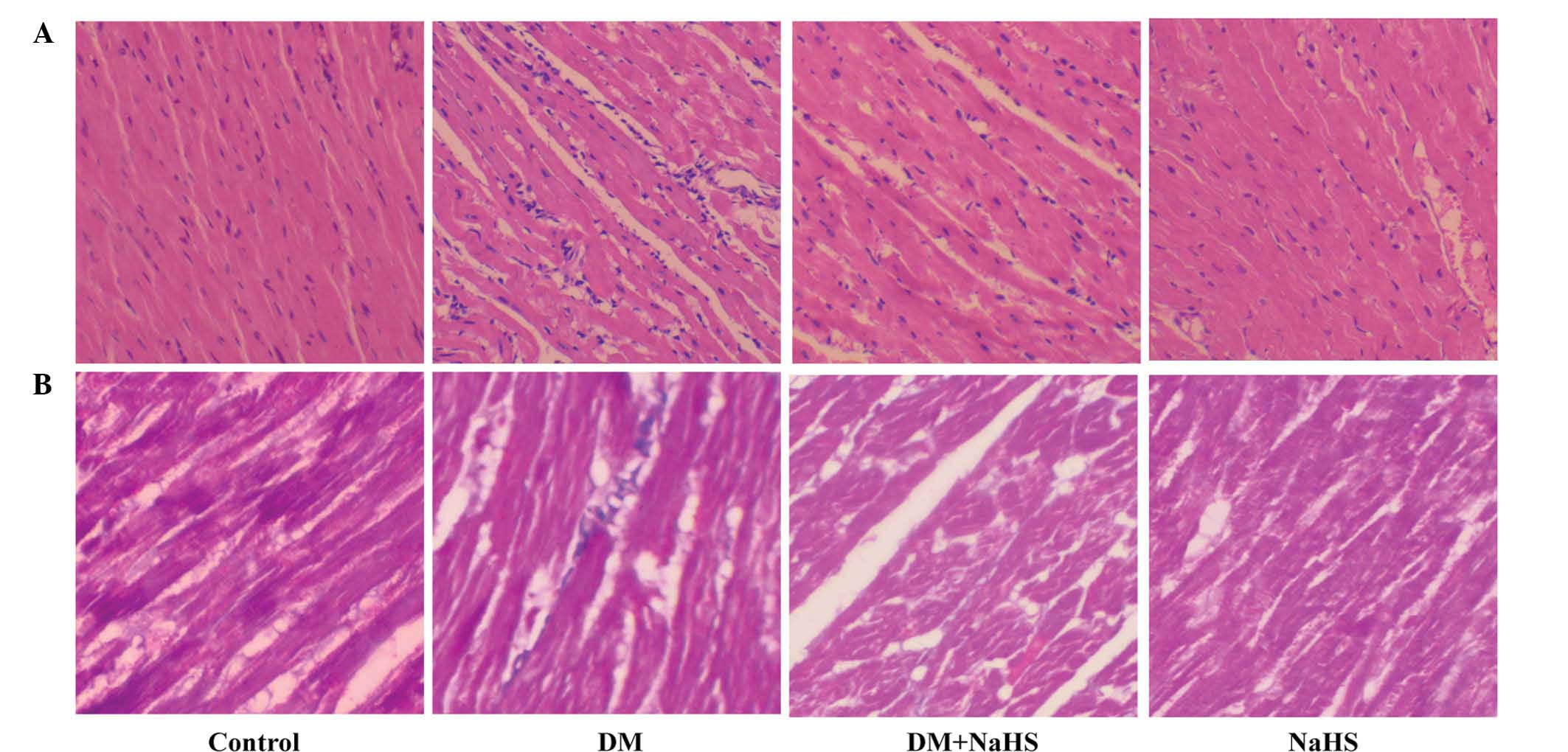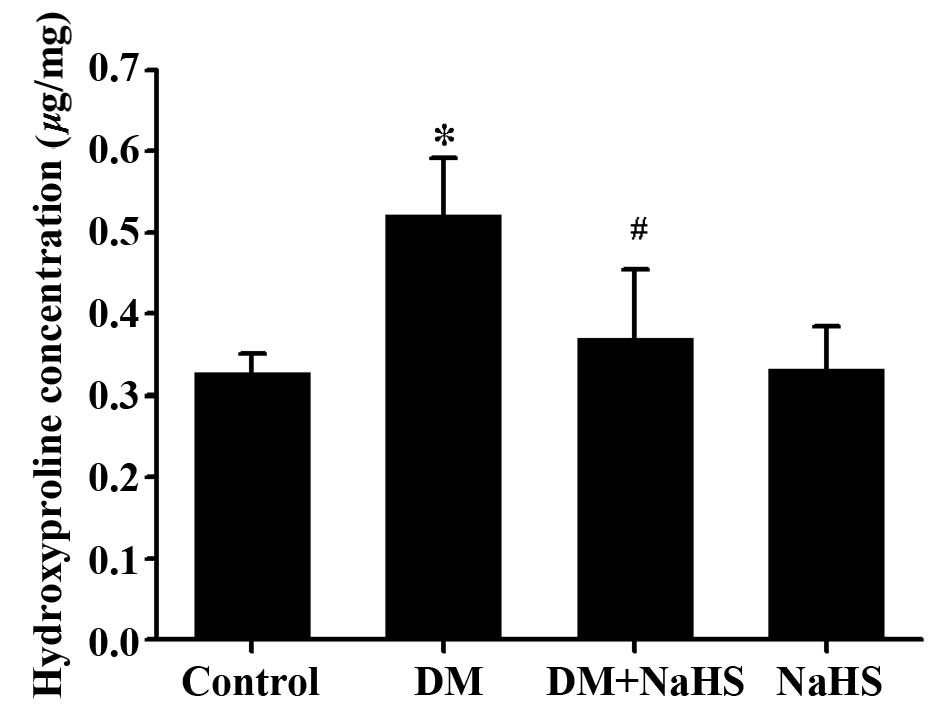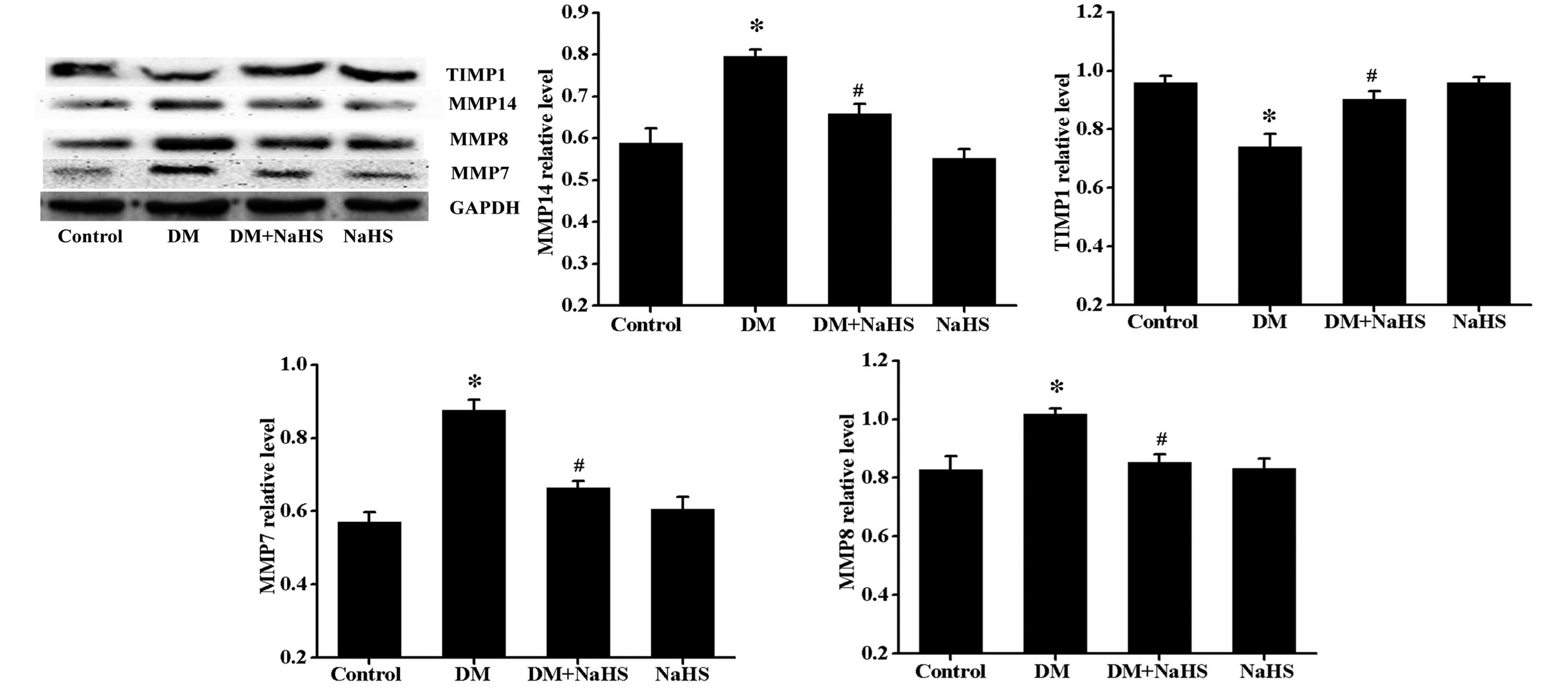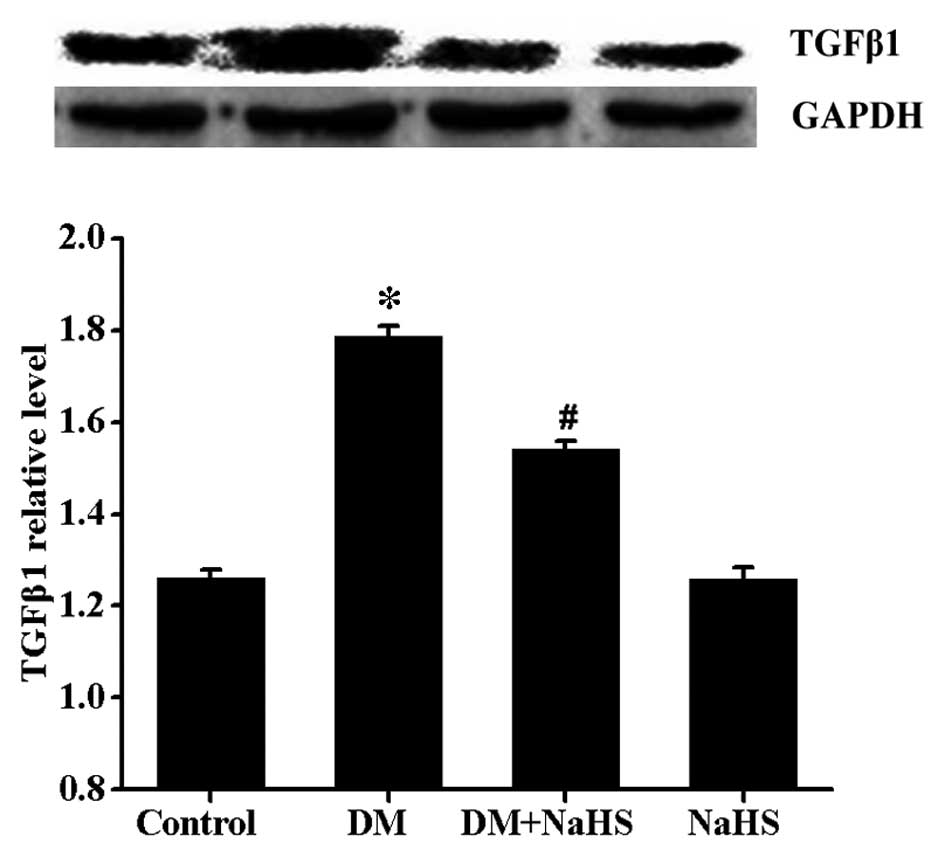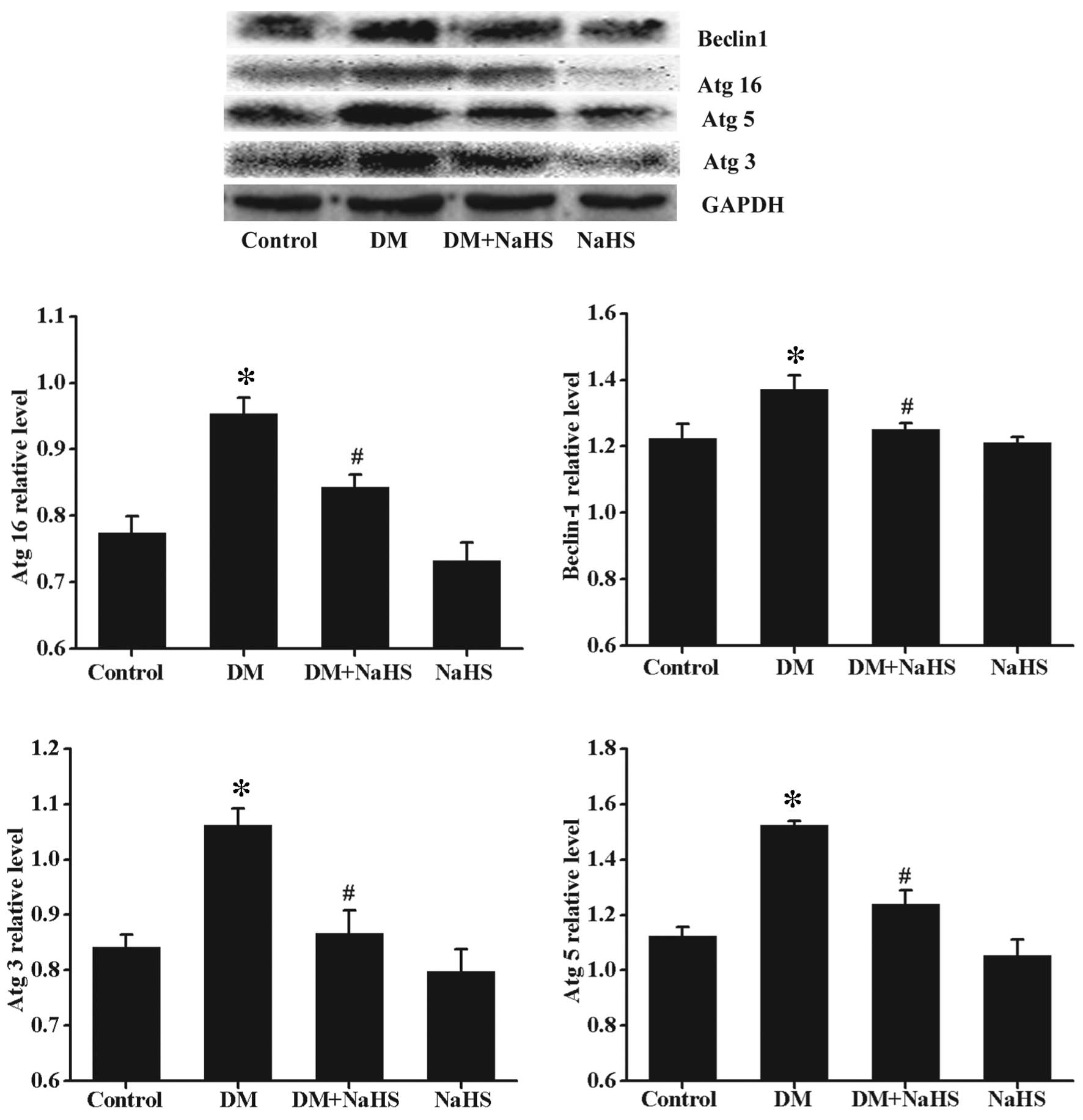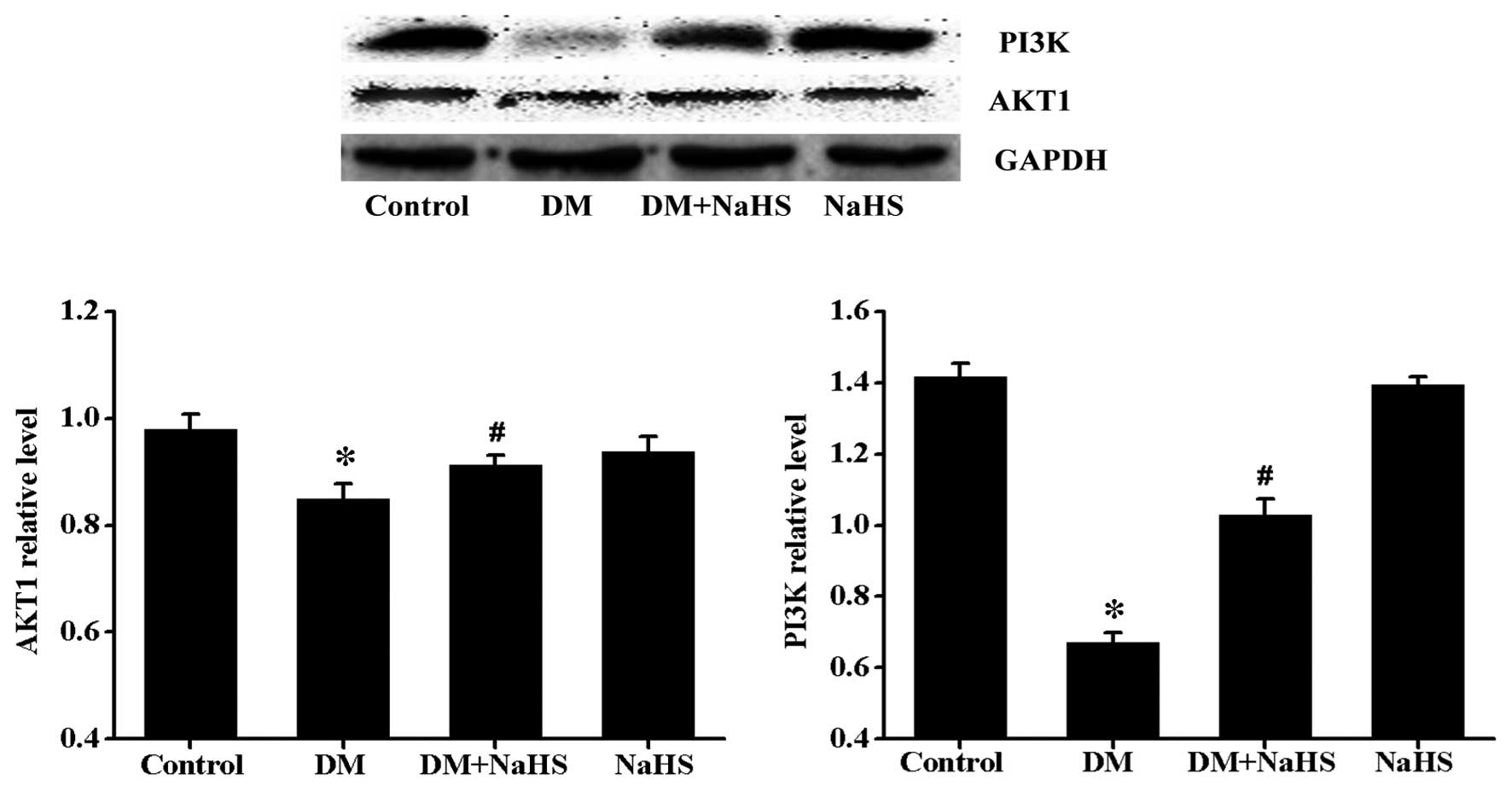|
1
|
Pappachan JM, Varughese GI, Sriraman R and
Arunagirinathan G: Diabetic cardiomyopathy: Pathophysiology,
diagnostic evaluation and management. World J Diabetes. 4:177–189.
2013.PubMed/NCBI
|
|
2
|
Asbun J and Villarreal FJ: The
pathogenesis of myocardial fibrosis in the setting of diabetic
cardiomyopathy. J Am Coll Cardiol. 474:693–700. 2006. View Article : Google Scholar
|
|
3
|
Falcão-Pires I and Leite-Moreira AF:
Diabetic cardiomyopathy: Understanding the molecular and cellular
basis to progress in diagnosis and treatment. Heart Fail Rev.
17:325–344. 2012. View Article : Google Scholar
|
|
4
|
Calvent JW, Coetzee WA and Lefer DJ: Novel
insights into hydrogen sulfide-mediated cytoprotection. Antioxid
Redox Sign. 12:1203–1217. 2010. View Article : Google Scholar
|
|
5
|
Yuan P, Xue H, Zhou L, Qu L, Li C, Wang Z,
Ni J, Yu C, Yao T, Huang Y, et al: Rescue of mesangial cells from
high glucose-induced over-proliferation and extracellular matrix
secretion by hydrogen sulfide. Nephrol Dial Transplant.
26:2119–2126. 2011. View Article : Google Scholar : PubMed/NCBI
|
|
6
|
Mani S, Li H, Untereiner A, Wu L, Yang G,
Austin RC, Dickhout JG, Lhoták Š, Meng QH and Wang R: Decreased
endogenous production of hydrogen sulfide accelerates
atherosclerosis. Circulation. 127:2523–2534. 2013. View Article : Google Scholar : PubMed/NCBI
|
|
7
|
King AL and Lefer DJ: Cytoprotective
actions of hydrogen sulfide in ischaemia-reperfusion injury. Exp
Physiol. 96:840–846. 2011. View Article : Google Scholar : PubMed/NCBI
|
|
8
|
Wang X, Wang Q, Guo W and Zhu YZ: Hydrogen
sulfide attenuates cardiac dysfunction in a rat model of heart
failure: A mechanism through cardiac mitochondrial protection.
Biosci Rep. 31:87–98. 2011. View Article : Google Scholar
|
|
9
|
Zhao W, Zhang J, Lu Y and Wang R: The
vasorelaxant effect of H(2)S as a novel endogenous
gaseous K(ATP) channel opener. EMBO J. 20:6008–6016. 2001.
View Article : Google Scholar : PubMed/NCBI
|
|
10
|
Zhao W, Ndisang JF and Wang R: Modulation
of endogenous production of H2S in rat tissues. Can J
Physiol Pharmacol. 81:848–853. 2003. View
Article : Google Scholar : PubMed/NCBI
|
|
11
|
Kang B, Hong J, Xiao J, Zhu X, Ni X, Zhang
Y, He B and Wang Z: Involvement of miR-1 in the protective effect
of hydrogen sulfide against cardiomyocyte apoptosis induced by
ischemia/reperfusion. Mol Biol Rep. 41:6845–6853. 2014. View Article : Google Scholar : PubMed/NCBI
|
|
12
|
Elrod JW, Calvert JW, Morrison J, Doeller
JE, Kraus DW, Tao L, Jiao X, Scalia R, Kiss L, Szabo C, et al:
Hydrogen sulfide attenuates myocardial ischemia-reperfusion injury
by preservation of mitochondrial function. Proc Natl Acad Sci USA.
104:15560–15565. 2007. View Article : Google Scholar : PubMed/NCBI
|
|
13
|
Calvert JW, Elston M, Nicholson CK,
Gundewar S, Jha S, Elrod JW, Ramachandran A and Lefer DJ: Genetic
and pharmacologic hydrogen sulfide therapy attenuates
ischemia-induced heart failure in mice. Circulation. 122:11–19.
2010. View Article : Google Scholar : PubMed/NCBI
|
|
14
|
Zhou X, Feng Y, Zhan ZB and Chen JC:
Hydrogen sulfide alleviates diabetic nephropathy in a
streptozotocin-induced diabetic rat model. J Biol Chem.
289:28827–28834. 2014. View Article : Google Scholar : PubMed/NCBI
|
|
15
|
Zhou X, An G and Chen J: Hydrogen sulfide
improves left ventricular function in smoking rats via regulation
of apoptosis and autophagy. Apoptosis. 19:998–1005. 2014.
View Article : Google Scholar : PubMed/NCBI
|
|
16
|
Levine B and Yuan J: Autophagy in cell
death: An innocent convict? J Clin Invest. 115:2679–2688. 2005.
View Article : Google Scholar : PubMed/NCBI
|
|
17
|
Mizushima N, Levine B, Cuervo AM and
Klionsky DJ: Autophagy fights disease through cellular
self-digestion. Nature. 451:1069–1075. 2008. View Article : Google Scholar : PubMed/NCBI
|
|
18
|
Janku F, McConkey DJ, Hong DS and Kurzrock
R: Autophagy as a target for anticancer therapy. Nat Rev Clin
Oncol. 8:528–539. 2011. View Article : Google Scholar : PubMed/NCBI
|
|
19
|
Younce CW, Wang K and Kolattukudy PE:
Hyperglycaemia-induced cardiomyocyte death is mediated via MCP-1
production and induction of a novel zinc-finger protein MCPIP.
Cardiovasc Res. 87:665–674. 2010. View Article : Google Scholar : PubMed/NCBI
|
|
20
|
Zhu H, Rothermel BA and Hill JA: Autophagy
in load-induced heart disease. Methods Enzymol. 453:343–363. 2009.
View Article : Google Scholar : PubMed/NCBI
|
|
21
|
Wang L, Yuan T, Du G, Zhao Q, Ma L and Zhu
J: The impact of 1,25-dihydroxyvitamin D3 on the expression of
connective tissue growth factor and transforming growth factor-β1
in the myocardium of rats with diabetes. Diabetes Res Clin Pract.
104:226–233. 2014. View Article : Google Scholar : PubMed/NCBI
|
|
22
|
Wang X, Lv H, Gu Y, Wang X, Cao H, Tang Y,
Chen H and Huang C: Protective effect of lycopene on cardiac
function and myocardial fibrosis after acute myocardial infarction
in rats via the modulation of p38 and MMP-9. J Mol Histol.
45:113–120. 2014. View Article : Google Scholar
|
|
23
|
Andreadou I, Iliodromitis EK, Rassaf T,
Schulz R, Papapetropoulos A and Ferdinandy P: The role of
gasotransmitters NO, H2S and CO in myocardial
ischaemia/reperfusion injury and cardioprotection by
preconditioning, postconditioning and remote conditioning. Br J
Pharmacol. 172:1587–1606. 2014. View Article : Google Scholar
|
|
24
|
Liu YH, Lu M, Xie ZZ, Hua F, Xie L, Gao
JH, Koh YH and Bian JS: Hydrogen sulfide prevents heart failure
development via inhibition of renin release from mast cells in
isoproterenol-treated rats. Antioxid Redox Signal. 20:759–769.
2014. View Article : Google Scholar
|
|
25
|
Zhou X, Lu X, Xu W and Chen J: Protective
effects of hydrogen sulfide against chronic alcohol intake-induced
left ventricular remodeling in rats. Cardiovasc Drugs Ther.
27:221–227. 2013. View Article : Google Scholar : PubMed/NCBI
|
|
26
|
Zhou X and Lu X: Hydrogen sulfide inhibits
high-glucose-induced apoptosis in neonatal rat cardiomyocytes. Exp
Biol Med (Maywood). 238:370–374. 2013. View Article : Google Scholar
|
|
27
|
Xu X, Ding F, Pang J, Gao X, Xu RK, Hao W,
Cao JM and Chen C: Chronic administration of hexarelin attenuates
cardiac fibrosis in the spontaneously hypertensive rat. Am J
Physiol Heart Circ Physiol. 303:H703–H711. 2012. View Article : Google Scholar : PubMed/NCBI
|
|
28
|
Bish LT, Yarchoan M, Sleeper MM, Gazzara
JA, Morine KJ, Acosta P, Barton ER and Sweeney HL: Chronic losartan
administration reduces mortality and preserves cardiac but not
skeletal muscle function in dystrophic mice. PLoS One.
6:e208562011. View Article : Google Scholar : PubMed/NCBI
|
|
29
|
Li YY, McTiernan CF and Feldman AM:
Interplay of matrix metalloproteinases, tissue inhibitors of
metalloproteinases and their regulators in cardiac matrix
remodeling. Cardiovasc Res. 46:214–224. 2000. View Article : Google Scholar : PubMed/NCBI
|
|
30
|
Li YY, Feng YQ, Kadokami T, McTiernan CF,
Draviam R, Watkins SC and Feldman AM: Myocardial extracellular
matrix remodeling in transgenic mice overexpressing tumor necrosis
factor alpha can be modulated by anti-tumor necrosis factor alpha
therapy. Proc Natl Acad Sci USA. 97:12746–12751. 2000. View Article : Google Scholar : PubMed/NCBI
|
|
31
|
Maquart FX, Bellon G, Chaqour B, Wegrowski
J, Patt LM, Trachy RE, Monboisse JC, Chastang F, Birembaut P and
Gillery P: In vivo stimulation of connective tissue accumulation by
the tripeptide-copper complex
glycyl-L-histidyl-L-lysine-Cu2+ in rat experimental
wounds. J Clin Invest. 92:2368–2376. 1993. View Article : Google Scholar : PubMed/NCBI
|
|
32
|
Dixon IM, Ju H, Reid NL, Scammell-La Fleur
T, Werner JP and Jasmin G: Cardiac collagen remodeling in the
cardiomyopathic Syrian hamster and the effect of losartan. J Mol
Cell Cardiol. 29:1837–1850. 1997. View Article : Google Scholar : PubMed/NCBI
|
|
33
|
Cowan KN, Jones PL and Rabinovitch M:
Regression of hypertrophied rat pulmonary arteries in organ culture
is associated with suppression of proteolytic activity, inhibition
of tenascin-C, and smooth muscle cell apoptosis. Circ Res.
84:1223–1233. 1999. View Article : Google Scholar : PubMed/NCBI
|
|
34
|
Spiekman M, Przybyt E, Plantinga JA, Gibbs
S, van der Lei B and Harmsen MC: Adipose tissue-derived stromal
cells inhibit TGF-β1-induced differentiation of human dermal
fibroblasts and keloid scar-derived fibroblasts in a paracrine
fashion. Plast Reconstr Surg. 134:699–712. 2014. View Article : Google Scholar : PubMed/NCBI
|
|
35
|
Lee WR, Kim KH, An HJ, Kim JY, Lee SJ, Han
SM, Pak SC and Park KK: Apamin inhibits hepatic fibrosis through
suppression of transforming growth factor β1-induced hepatocyte
epithelial-mesenchymal transition. Biochem Biophys Res Commun.
450:195–201. 2014. View Article : Google Scholar : PubMed/NCBI
|
|
36
|
Harris WT, Kelly DR, Zhou Y, Wang D,
MacEwen M, Hagood JS, Clancy JP, Ambalavanan N and Sorscher EJ:
Myofibroblast differentiation and enhanced TGF-B signaling in
cystic fibrosis lung disease. PLoS One. 8:e701962013. View Article : Google Scholar : PubMed/NCBI
|
|
37
|
Masola V, Zaza G, Secchi MF, Gambaro G,
Lupo A and Onisto M: Heparanase is a key player in renal fibrosis
by regulating TGF-β expression and activity. Biochim Biophys Acta.
1843:2122–2128. 2014. View Article : Google Scholar : PubMed/NCBI
|
|
38
|
Radovits T, Korkmaz S, Mátyás C, Oláh A,
Németh BT, Páli S, Hirschberg K, Zubarevich A, Gwanmesia PN, Li S,
et al: An altered pattern of myocardial histopathological and
molecular changes underlies the different characteristics of type-1
and type-2 diabetic cardiac dysfunction. J Diabetes Res.
2015:7287412015. View Article : Google Scholar : PubMed/NCBI
|
|
39
|
Yu X, Zhang Q, Cui W, Zeng Z, Yang W,
Zhang C, Zhao H, Gao W, Wang X and Luo D: Low molecular weight
fucoidan alleviates cardiac dysfunction in diabetic Goto-Kakizaki
rats by reducing oxidative stress and cardiomyocyte apoptosis. J
Diabetes Res. 2014:4209292014. View Article : Google Scholar : PubMed/NCBI
|
|
40
|
Nishida K and Otsu K: Cell death in heart
failure. Circ J. 72:A17–21. 2008. View Article : Google Scholar : PubMed/NCBI
|
|
41
|
Dong Y, Undyala VV, Gottlieb RA, Mentzer
RM Jr and Przyklenk K: Autophagy: Definition, molecular machinery,
and potential role in myocardial ischemia-reperfusion injury. J
Cardiovasc Pharmacol Ther. 15:220–230. 2010. View Article : Google Scholar : PubMed/NCBI
|
|
42
|
Dziedzic SA and Caplan AB: Autophagy
proteins play cyto-protective and cytocidal roles in leucine
starvation-induced cell death in Saccharomyces cerevisiae.
Autophagy. 8:731–738. 2012. View Article : Google Scholar : PubMed/NCBI
|
|
43
|
Nishida K, Kyoi S, Yamaguchi O, Sadoshima
J and Otsu K: The role of autophagy in the heart. Cell Death
Differ. 16:31–38. 2009. View Article : Google Scholar
|
|
44
|
Espert L, Denizot M, Grimaldi M,
Robert-Hebmann V, Gay B, Varbanov M, Codogno P and Biard-Piechaczyk
M: Autophagy is involved in T cell death after binding of HIV-1
envelope proteins to CXCR4. J Clin Invest. 116:2161–2172. 2006.
View Article : Google Scholar : PubMed/NCBI
|
|
45
|
Saeki K, Yuo A, Okuma E, Yazaki Y, Susin
SA, Kroemer G and Takaku F: Bcl-2 down-regulation causes autophagy
in a caspase-independent manner in human leukemic HL60 cells. Cell
Death Differ. 7:1263–1269. 2000. View Article : Google Scholar
|
|
46
|
Miyata S, Takemura G, Kawase Y, Li Y,
Okada H, Maruyama R, Ushikoshi H, Esaki M, Kanamori H, Li L, et al:
Autophagic cardiomyocyte death in cardiomyopathic hamsters and its
prevention by granulocyte colony-stimulating factor. Am J Pathol.
168:386–397. 2006. View Article : Google Scholar : PubMed/NCBI
|
|
47
|
Zhu H, Tannous P, Johnstone JL, Kong Y,
Shelton JM, Richardson JA, Le V, Levine B, Rothermel BA and Hill
JA: Cardiac autophagy is a maladaptive response to hemodynamic
stress. J Clin Invest. 117:1782–1793. 2007. View Article : Google Scholar : PubMed/NCBI
|
|
48
|
Matsui Y, Kyoi S, Takagi H, Hsu CP,
Hariharan N, Ago T, Vatner SF and Sadoshima J: Molecular mechanisms
and physiological significance of autophagy during myocardial
ischemia and reperfusion. Autophagy. 4:409–415. 2008. View Article : Google Scholar : PubMed/NCBI
|
|
49
|
Ma H, Guo R, Yu L, Zhang Y and Ren J:
Aldehyde dehydrogenase 2 (ALDH2) rescues myocardial
ischaemia/reperfusion injury: Role of autophagy paradox and toxic
aldehyde. Eur Heart J. 32:1025–1038. 2011. View Article : Google Scholar :
|















